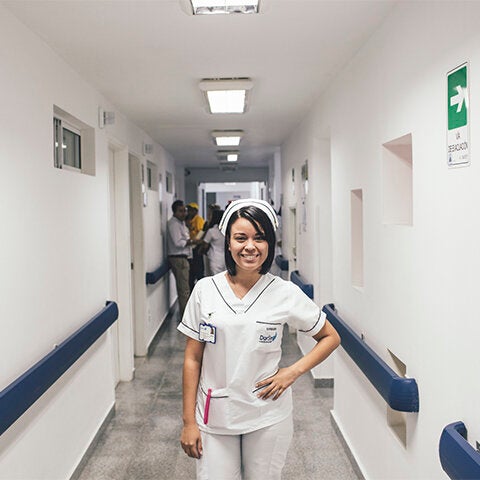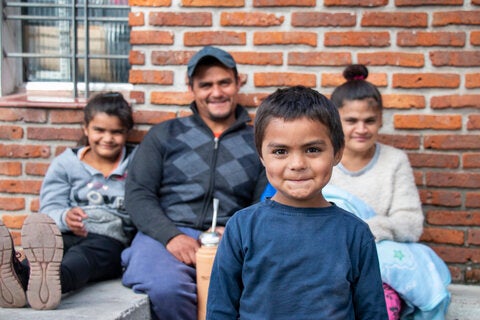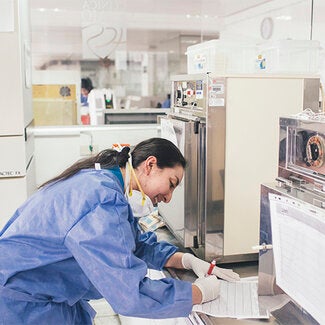Call for applications: Operational research to support the elimination of communicable diseases in the Latin American and Caribbean region
Read this information in Portuguese
Deadline for submission: 10 October 2022 (23:59 EST)
The Pan American Health Organization (PAHO), jointly with the UNICEF/UNDP/World Bank/WHO Special Programme for Research and Training in Tropical Diseases (TDR), is pleased to announce the 2022–2023 Impact Grants for Regional Priorities call for applications for operational research to support the elimination of communicable diseases in the Latin America and Caribbean (LAC) Region.
Eligible countries: Only applicants from Latin America and the Caribbean are eligible.
Proposals may be submitted in English, Spanish or Portuguese.
Objective
Facilitate and strengthen public health-oriented operational research on selected communicable diseases that are potential candidates for elimination as a public health problem through an integrated approach.
Methodology and funding scope
Interventions and research questions within the scope of this call are listed in the document linked below. These have been selected based on a priority selection process undertaken by the PAHO Communicable Disease Department.
The funding is available for research only.
This PAHO/TDR call will not fund treatment and routine delivery of health services. Implementation and operational research activities supported by this call may be complementary to those supported by other stakeholders interested in the diseases and conditions covered in this call.
How to apply
Applications should be submitted online no later than 10 October 2022 (23:59 EST) through the eTDR Community Site.
Related Links
|
Projects |
Topic |
Place |
Partner |
Start |
End |
|
Embedding Research for the Sustainable Development Goals (ER-SDG) |
|||||
|
Elements and processes that determine the implementation of national protocols for cutaneous leishmaniasis surveillance in the Department of Health Area of Alta Verapaz, Guatemala, 2019. |
Cutaneous leishmaniasis |
Guatemala |
Universidad del Valle de Guatemala |
Mar-2019 |
Mar-2020 |
|
Evaluation of the implementation of the Tuberculosis care cascade model for indigenous population in a region of Colombia. |
Tuberculosis |
Colombia |
Secretaría de Salud Departamental del Cauca |
Mar-2019 |
Dec-2019 |
|
Health system and individual factors linked to the success, non-success of the treatment of patients with multidrug-resistant tuberculosis in the six municipalities of Colombia with the highest number of cases, 2016-2017. |
Tuberculosis |
Colombia |
Instituto Nacional de Salud |
Mar-2019 |
Dec-2019 |
|
Strategies to increase therapeutic success in patients treated with tuberculosis at the first level of care: A systematic review and network meta-analysis. |
Tuberculosis |
Argentina |
Fundación GESICA |
Apr-2019 |
Mar-2020 |
|
Operationalization of the national malaria strategy in Guyana: a pilot project in region 8 (potaro-siparuni) and its progressive scale-up to all malaria endemic regions. |
Malaria |
Guyana |
Ministry of Public Health, Direction of Vector Control Services |
Apr-2019 |
Dec-2019 |
|
TDR Small Grants Projects – Implementation Research to tackle the threat of Antimicrobial Resistance (PAHO) |
|||||
|
Measurement of social inequalities in the antimicrobial resistance of the Neisseria Gonorrhoeae in Colombia: a mixed research approach |
AMR |
Colombia |
Asociación Profamilia |
2020 |
2021 |
|
Study of resistance to fosfomycin and plasmid genes isolated from E. Coli resistant to third generation cephalosporins in the broiler and human production chain in the Metropolitan District of Quito - Ecuador |
AMR |
Ecuador |
Universidad Central del Ecuador (UNIETAR) |
2020 |
2021 |
|
Program for the optimization of the use of antibiotics in institutions providing health services in the district of Barranquilla (Colombia) |
AMR |
Colombia |
Universidad Simón Bolívar |
2020 |
2021 |
|
TDR Small Grants Projects – Sexual and reproductive health rights and infectious diseases linked to migration (PAHO) |
|||||
|
Strategies to deal with HIV and syphilis among migrant women: The case of Brazil |
Infectious diseases |
Brazil |
Universidade Federal do Espírito Santo |
2020 |
2021 |
|
Access to comprehensive abortion care and sexual and reproductive health and rights among migrant women in Colombia |
Infectious diseases |
Colombia |
Fundación Universidad del Norte |
2020 |
2021 |
|
Sexual and reproductive health needs and practices among migrant population in Santiago de Cali, Colombia |
Infectious diseases |
Colombia |
Universidad del Valle |
2020 |
2021 |
|
Perceptions, behaviors, and unmet needs in sexual health of Venezuelan migrant sex workers in Colombia |
Infectious diseases |
Colombia |
Corporación Universitaria Minuto de Dios (UNIMINUTO) |
2020 |
2021 |
|
Risk factors, perceptions, social practices, access to sexual and reproductive health services, and HIV resistance among Venezuelan migrants |
Infectious diseases |
Colombia |
Fundación Info Vida |
2020 |
2021 |
|
Sexual and reproductive health and rights of Venezuela migrant women sex workers in Dominican Republic |
Infectious diseases |
Dominican Republic |
Universidad Iberoamericana |
2020 |
2021 |
|
Sexual and reproductive health service utilization among Venezuelan migrant women in Quito, Ecuador: Situational analysis |
Infectious diseases |
Ecuador |
Universidad Católica del Ecuador |
2020 |
2021 |
|
Challenges faced by El Salvador in complying with WHO guidelines on migration and health |
Infectious diseases |
Salvador |
Ministry of Health |
2020 |
2021 |
|
Exploratory study of the sexual and reproductive health of migrant women and girls from the Northern Triangle (“Triángulo Norte”) |
Infectious diseases |
Guatemala |
Population Services International, GTM |
2020 |
2021 |
|
Sexual practices, healthcare, and reproductive behaviors of Central American migrants in the Northern Mexican border |
Infectious diseases |
Mexico |
El Colegio de México |
2020 |
2021 |
|
Syphilis and sexually transmitted infections among migrants in Chiapas |
Infectious diseases |
Mexico |
Instituto Nacional de Salud Pública |
2020 |
2021 |
|
Responsive and accessible sexual and reproductive health services for migrant women in Peru |
Infectious diseases |
Peru |
Universidad Peruana Cayetano Heredia |
2020 |
2021 |
|
Projects & Publications |
Topic |
Place |
Partner |
Start |
End |
|
Supplement: Building opportunities during the Zika epidemic in the Americas: The case for strengthening research capacity International Journal of Gynecology & Obstetrics Volume 148, Issue S1 January 2020 |
|||||
|
TDR Small Grants Projects - ZIKA - Latin America and the Caribbean (WHO HRP) |
|||||
|
Investigation of the role of Zika virus infection in the epidemic of newborns with microcephaly in Salvador-Ba, Brazil: a prevalence study in pregnant women and neonates. |
Zika |
Brazil |
Instituto Gonçalo Moniz- Fiocruz |
2017 |
2018 |
|
Critical route for women affected by Zika and the exercise of sexual and reproductive rights in Venezuela |
Zika |
Venezuela |
Asociación Civil de Planificación Familiar PLAFAM. |
2017 |
2018 |
|
Contraceptive practices and reproductive preferences of women in primary care services: have there been changes after the outbreak of Zika virus in Brazil began? |
Zika |
Brazil |
Escola de Enfermagem da Universidade de São Paulo |
2017 |
2018 |
|
Contraceptive Use, Prenatal Counseling, and Abortion in the Context of Zika |
Zika |
Colombia |
Red de Salud Ladera ESSE |
2017 |
2018 |
|
Evaluation of acute infection by ZIKV, DENV and CHIKV viruses in transvestites from 12 Brazilian capitals through multitest on qPCR platform |
Zika |
Brazil |
Instituto de Biología Molecular do Paraná (IBMP) |
2017 |
2018 |
|
Maternal Perception and Behavior related to Reproductive Health in the context of Zika in Jamaica |
Zika |
Jamaica |
University of the West Indies, Mona |
2017 |
2018 |
|
Health services response in clinical approach to Zika pregnant women in two municipalities in Colombia 2015-2017
|
Zika |
Colombia |
Universidad de Los Andes |
2017 |
2018 |
|
Knowledge and perceptions to family planning, concerns of the adverse pregnancy outcomes related to Zika virus, and health-seeking behavior of services among women in Colombia |
Zika |
Colombia |
Uni CES Medellin |
2017 |
2018 |
|
TDR Small Grants Projects – ZIKA - Latin America and the Caribbean (PAHO) |
|||||
|
Spatial distribution and temporal variation of risk of Zika virus infection in regions of Colombia during the 2015-2016 epidemic |
Zika |
Colombia |
Universidad del Norte |
2017 |
2018 |
|
Identification, characterization and local adaptation of policies for the prevention, detection and care of the Zika virus in 3 municipalities of Colombia and its relationship with the National Policy on Sexuality, Sexual Rights and Reproductive Rights |
Zika |
Colombia |
Asociación Probienestar de la Familia Colombiana – Profamilia |
2017 |
2018 |
|
Data mining of social indicators and health databases to detect risk factors of severe forms of Zika virus in Brazil |
Zika |
Brazil |
Fundação Para o Desenvolvimento Científico e Tecnológico em Saúde |
2017 |
2018 |
|
Field evaluation of a non-commercial ELISA test for the detection of anti-Zika virus IgM in the Yucatan Peninsula |
Zika |
Mexico |
Fundación Mexicana para la Salud, Capitulo Peninsular A.C. |
2017 |
2018 |
|
Exploring reproductive health decisions under Zika's threat in Piura-Peru |
Zika |
Peru |
Universidad Peruana Cayetano Heredia - Facultad de Salud Pública y Administración |
2017 |
2018 |
|
Public health policies in emergency situations: the outbreak of Zika virus
|
Zika |
Brazil |
Universidade Federal do Espírito Santo |
2017 |
2018 |
|
Reproductive concerns and decisions of adolescent girls and adult women in the time of Zika: The role of long-term contraception |
Zika |
Peru |
Universidad Peruana Cayetano Heredia |
2017 |
2018 |
Small Grants for Operational research
We promote and support operational and implementation research initiatives that seek to solve technical and implementation problems of health-related interventions addressing the burden of infectious diseases. To combat diseases and to improve the quality of, and lengthen, the lives of the peoples of the Americas, Member States, and partners implement a series of efforts translated into projects, programs and policies. We support these efforts through operational and implementation research by generating evidence that is useful for policy making and for the implementation of new solutions to country needs. In addition, we use multi-disciplinary and multi-sectoral approaches to research and community engagement to develop locally relevant solutions.
Since 2017, we had several rounds of calls to implement operational research proposals in 13 countries of the LAC region. 32 research proposals were funded with close to US$852,000.
Click below to see projects and publications.
Call for applications
Embedding Research for the Sustainable Development Goals
The next call will be release in March/April 2020, approximately. It will cover the following topic: PAHO/TDR Call for proposals on Elimination of Communicable Diseases, 2020—2021. If you are interested in receiving announcements for calls and other information on PAHO/Communicable Disease-related activities, please, sign up here.
Capacity Building
In alliance with TDR/SORT-IT, we implement calls on selected topics and countries to strengthen capacities of program managers to perform operational and implementation research on communicable diseases in the Region. Specifically, through direct training to selected public officers, we seek to bridge the gap between research, policy and practice to achieve health for all. To this end, we combine the benefits of hands-on training, instructor-led classroom training, coaching and mentoring, and interactive methods. Selected public officers (fellows) not only strengthen their operational research capacities but also share their experience with colleagues from other regions during the training process. In addition, fellows graduated from the program become part of a selected group of professionals who share their knowledge, collaborate in projects, and support other colleagues across the region through PAHO/WHO’s professional network.
The following documents detail this successful initiative:
Since 2015, we have implemented 6 rounds of calls to strengthen operational and implementation research capacities on communicable diseases in the Region. A total of 53 fellows from 11 countries graduated from the SORT-IT program and are part of the PAHO’s professional network. 21 papers published in academic journals are impacting practice, programs, and policies.
|
Topic |
Location |
Language |
Beneficiary countries |
Number of fellows |
Start |
End |
Publications |
|
TB |
Panama (regional) |
English |
2 Brazil, 1 Colombia, 1 Dominican Republic, 1 El Salvador, 1 Guatemala, 1 Honduras, 2 Mexico, 1 Peru |
10 |
2014 |
2015 |
Supplement: Operational research to strengthen tuberculosis control in the Americas. Rev Panam Salud Publica 39(1), 2016 |
|
TB-HIV |
Colombia |
Spanish |
10 Colombia |
10 |
2017 |
2018 |
|
|
Malaria, TB-HIV |
Surinam |
English |
8 Suriname |
8 |
2017 |
2018 |
|
|
TB-HIV |
Brazil |
Portuguese |
15 Brazil |
15 |
2017 |
2018 |
|
|
TB |
Peru (sub-regional) |
Spanish |
7 Ecuador, 3 Paraguay |
10 |
2018 |
2019 |
Supplement: Operational research towards TB elimination in the Americas. Rev Panam Salud Publica 43, 2019 |
Call for applications
Operational Research to Support the Elimination of Communicable Diseases in the Latin American and Caribbean Region
The Pan American Health Organization (PAHO) in collaboration with the Special Program for Research and Training in Tropical Diseases (TDR), is pleased to announce the 2020 – 2021 call for applications for the Joint PAHO/TDR Small Grant Scheme for operational research. The objective of the call is to facilitate and strengthen elimination-oriented operational research in selected communicable diseases that are potential candidates for elimination through an integrated approach. Interventions and research questions within the scope of this call as well as eligibility criteria and information on how to apply are included in the call.
Study duration: 12-18 months
Application deadline: 31July 2020 23:59 Eastern Standard Time
How to submit the application: The completed application form should be signed by all investigators and submitted to PAHO-TDR focal point and Regional Advisor on Communicable Disease Research: Dr. Freddy Perez: perezf@paho.org and Ms Brindis Ochoa: ochoabri@paho.org
- Application instructions
- Application form: PDF | Word
Call for applications
Colombia / Ecuador – Iniciativa de investigación operativa estructurada y capacitación para abordar la resistencia a los antimicrobianos
This latest call for Colombia and Ecuador will select 12 fellows (8 in Colombia, 4 in Ecuador) who are expected to participate in the capacity building program on Antimicrobial resistance 2020-2022.
If you are interested in receiving announcements for calls and other information on PAHO/Communicable Disease-related activities, please, sign up here.





